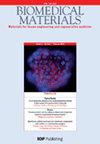Differential in vitro degradation and protein adhesion behaviour of spark plasma sintering fabricated magnesium-based temporary orthopaedic implant in serum and simulated body fluid
IF 3.7
3区 医学
Q2 ENGINEERING, BIOMEDICAL
引用次数: 9
Abstract
The interaction of proteins with implantable metallic surfaces has a great influence on the bioactivity and biodegradation of orthopaedic implants. Initial osseointegration is known to be critical for the long term success of orthopaedic implants. The surface properties of the implant and electrochemical milieu of the surrounding solution such as electrostatic, hydrophobic, and hydrogen bonding interactions significantly modulate protein adsorption by implants. Magnesium (Mg) is considered to improve the adhesion of osteoblasts via ligand binding of the integrin receptors. Mg-based composites, reinforced with hydroxyapatite (HA), are potential candidates for temporary orthopaedic implants. However, their clinical translation requires enhanced degradation resistance in physiological environment so that it is in sync with the healing rate of the bone. The present study deals with the protein adsorption characteristics and degradation behaviour of Mg-HA-based biodegradable implants. Quantitative analysis of apatite inducing ability of composites was evaluated in terms of mass gain in simulated body fluid (SBF) as well as in foetal bovine serum (FBS), by an in vitro immersion study. Incorporation of 5 and 15 wt% HA to Mg-3Zn improved apatite formation up to 35% and 66%, respectively, after 14 days of immersion in SBF. Compared to FBS, SBF is found to be significantly more effective in precipitating apatite on a Mg-HA surface. However, FBS offered more corrosion resistance to Mg-HA than SBF did, as evident from the significant differences in the protein adhesion capabilities of the composite surface when incubated separately in these two mediums. The addition of 15 wt% HA enhanced the protein adsorption capability by ∼35%. These studies highlight the possibility of modulating the degradation and bioactivity of Mg-based composite by tailoring the composition of HA. These findings, in turn, warrant the suitability of Mg-HA composite in orthopaedic application.火花等离子烧结制备的镁基临时骨科植入物在血清和模拟体液中的体外降解差异及蛋白质粘附行为
蛋白质与可植入金属表面的相互作用对骨科植入物的生物活性和生物降解有很大影响。最初的骨融合对于骨科植入物的长期成功至关重要。植入物的表面性质和周围溶液的电化学环境,如静电、疏水和氢键相互作用,显著地调节了植入物对蛋白质的吸附。镁(Mg)被认为通过整合素受体的配体结合来改善成骨细胞的粘附。羟基磷灰石(HA)增强的镁基复合材料是临时骨科植入物的潜在候选材料。然而,它们的临床转化需要在生理环境中增强抗降解能力,使其与骨的愈合速度同步。本研究研究了mg - ha基生物可降解植入物的蛋白质吸附特性和降解行为。通过体外浸渍试验,定量分析了复合材料在模拟体液(SBF)和胎牛血清(FBS)中诱导磷灰石的能力。Mg-3Zn中加入5%和15%的HA,在SBF中浸泡14天后,磷灰石的形成分别提高了35%和66%。与FBS相比,SBF在Mg-HA表面沉淀磷灰石方面明显更有效。然而,FBS对Mg-HA的耐腐蚀性比SBF更强,这可以从两种培养基中分别孵育时复合材料表面蛋白质粘附能力的显著差异中看出。添加15 wt%的HA可使蛋白质吸附能力提高约35%。这些研究强调了通过调整透明质酸的组成来调节镁基复合材料的降解和生物活性的可能性。这些发现反过来保证了Mg-HA复合材料在骨科应用中的适用性。
本文章由计算机程序翻译,如有差异,请以英文原文为准。
求助全文
约1分钟内获得全文
求助全文
来源期刊

Biomedical materials
工程技术-材料科学:生物材料
CiteScore
6.70
自引率
7.50%
发文量
294
审稿时长
3 months
期刊介绍:
The goal of the journal is to publish original research findings and critical reviews that contribute to our knowledge about the composition, properties, and performance of materials for all applications relevant to human healthcare.
Typical areas of interest include (but are not limited to):
-Synthesis/characterization of biomedical materials-
Nature-inspired synthesis/biomineralization of biomedical materials-
In vitro/in vivo performance of biomedical materials-
Biofabrication technologies/applications: 3D bioprinting, bioink development, bioassembly & biopatterning-
Microfluidic systems (including disease models): fabrication, testing & translational applications-
Tissue engineering/regenerative medicine-
Interaction of molecules/cells with materials-
Effects of biomaterials on stem cell behaviour-
Growth factors/genes/cells incorporated into biomedical materials-
Biophysical cues/biocompatibility pathways in biomedical materials performance-
Clinical applications of biomedical materials for cell therapies in disease (cancer etc)-
Nanomedicine, nanotoxicology and nanopathology-
Pharmacokinetic considerations in drug delivery systems-
Risks of contrast media in imaging systems-
Biosafety aspects of gene delivery agents-
Preclinical and clinical performance of implantable biomedical materials-
Translational and regulatory matters
 求助内容:
求助内容: 应助结果提醒方式:
应助结果提醒方式:


